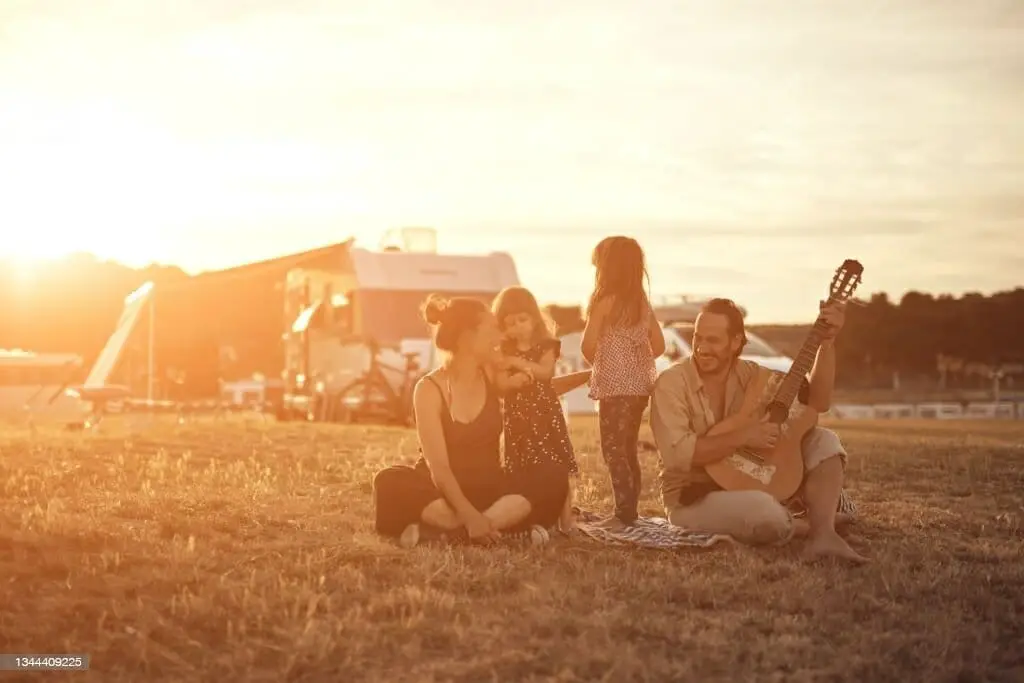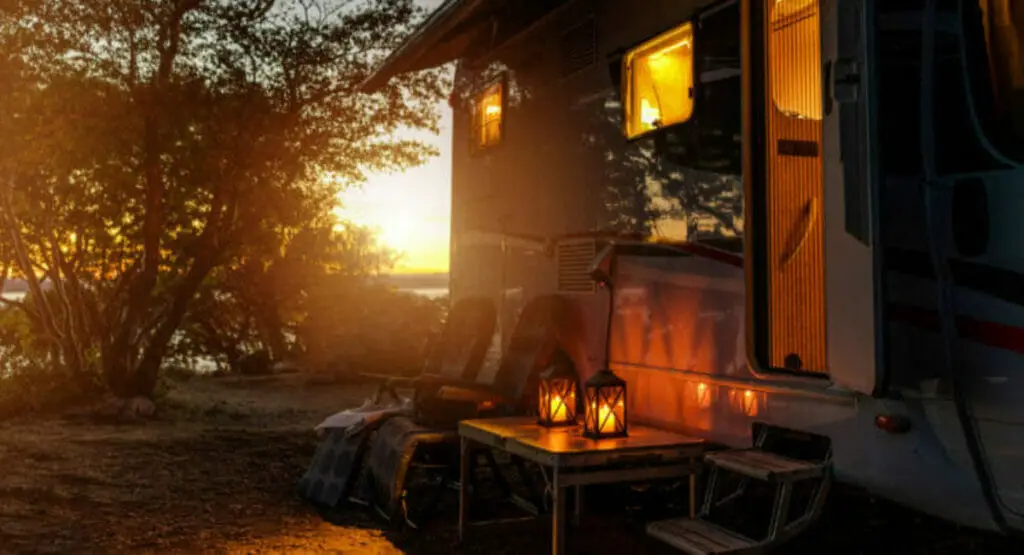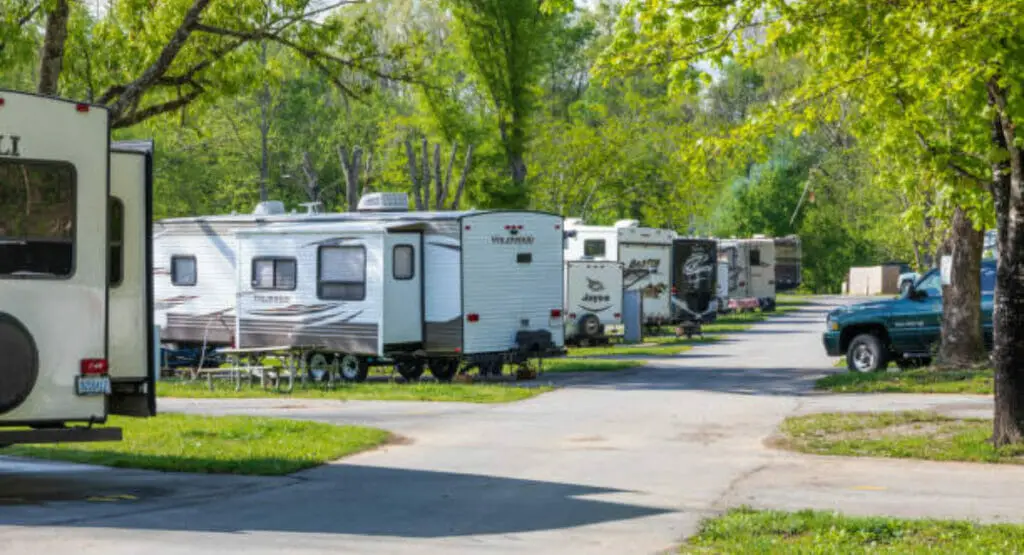RV life with children may be an exciting and unique way for families to travel and experience the nation together. However, it’s crucial to have reasonable expectations and be ready for the challenges that come with living in a smaller space.
Living in an RV with kids can be a great way for families to travel and experience new places together while strengthening their bonds and creating new memories. But it’s important to set reasonable goals and be ready for the challenges of living in a small space. When preparing to live in an RV with their children, parents should consider the following goals:
1. Ensuring Adequate Space and Amenities
When RVing with children, it is critical to ensure that there is enough space for everyone to be comfortable and that the children have enough space to play and learn. Choosing an RV that is expressly made for families, such as a bigger Class A motorhome or a travel trailer with bunk beds or other built-in sleeping arrangements for children, is one option.
Another way to make sure there is enough room is to examine the RV’s layout and intended purpose. For example, if the kids will be spending a lot of time in the RV while it is parked, a separate bedroom area as well as a place for them to play and complete schoolwork is essential. A convertible dinette or a pull-out sofa is also an excellent alternative for families.
It’s also vital to think about the RV’s storage choices. It is critical to have enough storage space for clothing, toys, and other goods in order to keep the RV orderly and pleasant for everyone. Parents should also consider the RV’s bathroom and kitchen layouts, as well as the number of beds.
Moreover, think about the RV’s exterior space and how it may be used. RVs with slide-outs, awnings, or outdoor kitchens may increase living space and make RV life with children more comfortable.
Furthermore, ensuring that the RV has enough space for everyone to be comfortable, as well as enough area for the kids to play and learn, is critical for a great RV living with kids experience. To select the ideal RV with the proper features and layout, extensive planning and research are required.
2. Educational opportunities
When organizing educational and social activities for children while traveling in an RV, there are a few factors to consider. A different option is to look into and visit educational facilities and locations that fit the children’s interests and curricula, like museums, national parks, and historical sites.
Homeschooling or online schooling may also offer a structured educational experience while on the road.
Another choice is to look for RV parks or campgrounds that provide sports, games, and other kid-friendly activities. It can also present chances for interaction and entertainment for the kids to become a part of an RV community, like an RV club.
Children should be encouraged to explore their surroundings, whether by swimming, riding, or hiking. Encourage them to read books, learn about local culture and history, and try new activities. To enrich and teach kids about the RV lifestyle, one must be adaptable and creative.
3. Limited storage and privacy
When living in an RV with children, it’s important to be ready for the challenges of living in a smaller space, such as the lack of privacy and constrained storage. Prioritizing and decluttering before going on the road is one method to prepare for these problems. This will help free up space in the RV and make organization easier.
Another strategy for getting ready is to set rules and routines for the kids, such as designated times for playtime, homework, and quiet time. This can aid in the preservation of privacy and order within the RV. Planning outdoor activities can give one a sense of solitude and personal space and can be a welcome change of pace.
It is also critical to communicate frankly and honestly with everyone in the RV. This can help avoid cramped and anxious sensations. To avoid feeling overwhelmed, create time for yourself, whether it’s through reading, writing, or going for a walk.
It is critical to remember that living in an RV with children can be an exciting and fulfilling experience. Accept the obstacles and make the most of your family’s time together. Using storage solutions and keeping organized will help you make the most of the space you have and make the RV lifestyle more enjoyable for the entire family.
4. Sleeping and Study Area, Safety Features and Entertainment
When traveling with children, it is essential to make sure that the RV has the appropriate amenities for them. A safe and secure sleeping environment for youngsters is a crucial factor. Bunk beds, a dedicated sleeping space with a curtain for seclusion, or a separate room for youngsters might be included.
A designated area for the kids to play or do their homework is a crucial consideration. This could be a desk or table that is permanently installed, or it could be a portable option that can be set up and taken down as needed. Ample lighting and power outlets are also necessary for the students to finish their schoolwork and other activities.
Other features to consider are a kid-friendly bathroom with a step stool and a separate sink, a storage area for toys and games, and a comfy lounging area for the kids. It’s also a good idea to pack a portable DVD player or tablet to keep you entertained while traveling.
The RV must have safety features like tight cabinets and drawer closures in order to prevent accidents. Finally, before you hit the road, make sure that the RV has functional smoke and carbon monoxide alarms for the protection of your children.
5. Strategies for Addressing Kids’ Mental and Emotional Well-being in RV Living
Be aware that living in an RV with kids can have an impact on their mental and emotional health, and be ready to handle any issues that may arise.
Regular check-in: Check in with the kids on a regular basis and ask them how they’re feeling and what they’re going through.
Encourage open communication: encourage open communication with your children and make them feel comfortable voicing their thoughts and worries.
Maintain a schedule: Establishing and keeping to a routine can offer a feeling of stability and normalcy for the children.
Prepare for homesickness: Being away from familiar surroundings and friends can create homesickness in children, so it’s critical to be prepared for it and have coping mechanisms in place.
Prepare for emotional outbursts: Children can have emotional outbursts, especially if they are overwhelmed or worried; therefore, it is vital to be prepared for this and have coping methods in place.
Plan activities and adventures for the kids: While on the road, plan activities and experiences that they will like. This will keep their spirits up and make the trip more enjoyable and exciting for them.
Seek expert help if necessary: If the child’s mental and emotional well-being is suffering, seek professional assistance. A therapist or counselor can assist them in processing the specific problems of RV living and adjusting to this new way of life.
Living in an RV with kids can be a unique and enjoyable experience, but it’s important to be mindful of the potential impact on the kids’ mental and emotional health and ready to handle any challenges that may arise.
6. Creating a Road Safety and Health Plan for RV Travel
When traveling with children in an RV, it’s important to make sure that the family has a plan for maintaining their health and safety while on the road.
Pack a first-aid kit: Necessities such as band-aids, painkillers, and any prescription prescriptions that may be required.
Prepare for crises: Make a strategy for situations such as natural catastrophes, automobile breakdowns, or medical problems.
Medical research facilities: Investigate medical institutions and hospitals in the regions you’ll be visiting and keep their contact information on hand in case of an emergency.
Research medical facilities: Follow safety recommendations while RVing, including as securely fastening unsecured goods, using seat belts, and adhering to speed restrictions
Follow safety guidelines: Follow safety recommendations while RVing, including as securely fastening unsecured goods, using seat belts, and adhering to speed restrictions.
Plan for food safety: Plan for food safety by carefully storing perishable materials as well as properly preparing and cooking food.
Be aware of the weather and plan appropriately: Be aware of the weather conditions and plan accordingly. Avoid traveling in inclement weather and make sure the RV has the required safety measures.
Have a fire protection strategy in place: Make sure everyone understands where the fire extinguisher and smoke detectors are and have a plan in place in case of a fire.
Keep hygiene: Maintain hygiene by developing a plan for sanitation and cleanliness while on the road.
Overall, it is important to be proactive and have a plan in place to ensure the health and safety of the family while on the road in an RV.
7. Developing a Financial Plan for RV Living with Children
RV living with kids requires a financial plan to make sure the family can maintain their desired lifestyle and budget while on the road. This plan should include strategies for budgeting, saving, and managing expenses related to RV maintenance, fuel, campsites, and other costs associated with traveling. Additionally, it may be necessary to consider how the cost of education and healthcare will be handled while on the road, as well as how to handle the loss of income if one of the parents stops working. Overall, having a well-thought-out financial plan can help ensure that the family is able to enjoy their travels without worrying about money.
Conclusion
Finally, it’s important to be mindful of the potential impact on the kids’ mental and emotional well-being and to be prepared to address any issues that may arise. RV living with kids can be a great way to bond as a family and create new memories, but it’s important to make sure that the kids are happy and healthy while on the road.
Overall, RV living with kids is possible with proper planning and preparation. It can be a great way for families to travel and explore the country together, but it’s important to be prepared for the challenges that come with living in a smaller space.



